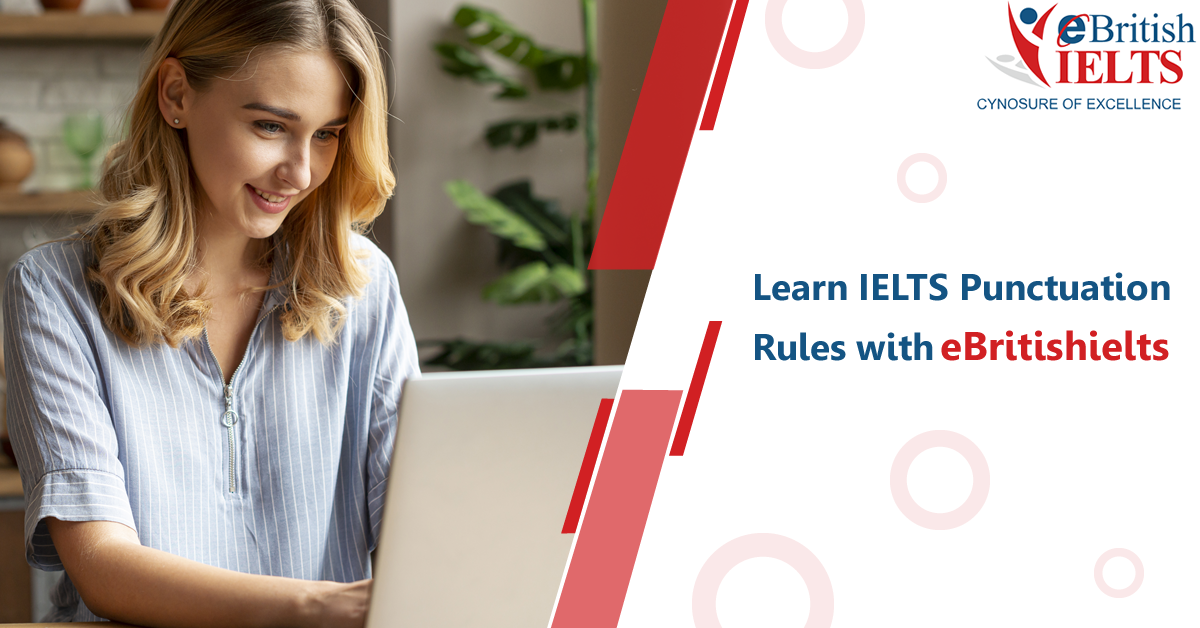
Learn IELTS Punctuation Rules with eBritishielts!
For the IELTS Writing test, there are numerous factors that play a role in deciding your score in the module. These include:
- Grammar
- Spelling
- Coherence
- Organization
- Vocabulary
- Sentential range
- Punctuation
While the other factors are quite crucial, people tend to ignore the punctuation rules. However, quite a lot of marks can be lost due to missing punctuation or the wrong ones. So, in this article today, we will be looking at some of the IELTS punctuation rules that you must be mindful of while appearing for your IELTS test. Let us get started.
IELTS Punctuation Rules
Here is how to use the IELTS punctuation marks correctly. The list is in the order of importance of these rules.
1. Full Stop/Period (.)
The first and the most important IELTS punctuation rule is about the use of a full stop/period. Let us see how to use it:
- At the End of Sentences
As soon as you finish a sentence, using a full stop or period is very important. Without it, a sentence is incomplete. So, for your essay in the IELTS Writing test, you must keep this in mind.
For example,
We watched TV last night.
She woke up early and made coffee for herself.
- At the End of Abbreviations
The second rule among the IELTS punctuation rules is the use of abbreviations or short forms of a word. Whenever you write a shortened form of a word in the English language, you need to end it with a full stop.
For example,
Pizza, burger, fries, etc. are unhealthy.
Dr. Watson has retired.
2. Comma (,)
The next among the IELTS punctuation rules is the use of a comma. It needs to be used in various contexts like:
- For Separating Clauses
In the IELTS punctuation rules, different clauses in a sentence must be separated with a comma.
For example,
Like the other day, the sun is shining today, as well.
Unlike offline coaching, IELTS online preparation is cost-effective.
- After Adverbs at The Beginning of a Sentence
If you use an adverb at the beginning of a sentence, as per rules, a comma must follow.
For example,
Undeniably, getting your desired IELTS band score requires a lot of practice.
Usually, this street is busy at this time of the day.
- When You List More Than Two Things in A Sentence
As per the IELTS punctuation rules, when you are listing more than two things, you need to separate them with a comma.
For example,
The IELTS Academic Test has four modules – Reading, Writing, Listening and Speaking.
She needs sausages, eggs, and coffee for breakfast.
- While Using Multiple Adjectives to Modify A Noun
Use a comma to separate multiple adjectives that describe a Noun.
For example,
Today is a bright, sunny day,
A quick, brown fox jumped over the wall.
- With Numbers That Have More Than 3 Digits
The IELTS punctuation rules for the use of a comma states that if a number has more than three numerals, you must use a comma.
For example,
1,000
3,23,648
3. Apostrophe (’)
In the IELTS punctuation rules, the use of an apostrophe is crucial, as well. Take care of it for the following situations in your IELTS test:
- When Showing Ownership or Possession.
To show possession, if the Noun ends with s, you need to use an apostrophe after it. Further, use and ’s in case it ends with any other letter.
For example,
I envy senators’ lives.
This is my mother’s watch.
- For Contractions
As per the IELTS punctuation rules, if you want to eliminate any letter from informal English in your IELTS Academic Writing test, you can simply replace it using an apostrophe.
For example,
I’m afraid I can’t complete this.
Isn’t IELTS online training convenient?
4. Question Mark (?)
The IELTS punctuation rules for the use of a question mark state that you need to put it at the end of interrogative sentences.
For example,
What is the difference between paper-based and computer-aided IELTS?
Do you know about the validity of the IELTS exam?
5. Semicolon (;)
As per the IELTS punctuation rules, a semicolon joins two closely related sentences together. This is the rule where people tend to make a mistake.
For example,
I have my IELTS exam tomorrow; I can’t party tonight.
I read a book; it had an amazing storyline.
6. Colon (:)
In the IELTS punctuation rules, the colon is used to introduce one or more items.
For example,
His greatest dream: To visit India.
To prepare for IELTS from home, you will need the following: an online IELTS training course, a laptop, your suitable schedule, and IELTS practice tests.
7. Exclamation Mark (!)
As stated by the IELTS punctuation rules, this is used after an expression of emotion.
For example,
Are you for real!
Wow! She got a Band 8 score in her Academic IELTS exam!
Conclusion
So, these are some of the IELTS punctuation rules you must know. You can practice for your IELTS writing test with eBritishielts easily. Alongside the preparation, you are sure to learn about numerous other punctuation and grammar rules that will come in handy during your IELTS test. To get started, sign up with eBritishielts for free now! Here is how online IELTS preparation with eBritishielts works:

Related Posts :-
1. Turn the Coronavirus Crisis in Your Favor to Get an IELTS Band 8 Score
2. Preparing for IELTS At Home
3. IELTS Preparation Delayed Due To COVID-19? Ebritishielts Is Here with A Plan B!
4. How to Prepare for IELTS from your Laptop?
5. IELTS Preparation Online – How to Choose the Best Package
 info@epadho.com
info@epadho.com +91-9988557784
+91-9988557784






